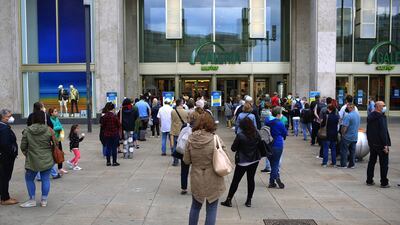The eurozone economy shrank less than expected in the first quarter, indicating a resilience in the region despite tighter lockdowns at the start of the year.
Gross domestic product in the 19 countries sharing the euro contracted 0.3 per cent in the first quarter of this year compared to the previous three-month period, with a 1.3 per cent annual decline, revised data from Eurostat showed. This compares with the respective declines of 0.6 per cent and 1.8 per cent estimated three weeks ago.
“The eurozone GDP data for Q1 was revised up and confirmed the resilience of economic activity during the reimposed wave of lockdowns across the bloc,” Maddalena Martini, economist at Oxford Economics said.
The 0.3 per cent contraction came after a 0.6 per cent quarterly fall in GDP, meaning the eurozone economy was in its second recession since the outbreak of Covid-19.
Eurostat said employment fell 0.3 per cent quarter-on-quarter in January-March and was down 1.8 per cent compared to the same quarter a year ago.
Meanwhile, economic sentiment experienced a setback in June, a report by research institute Zew said, declining to 81.3, from the record-high in May at 84, but it remained at elevated levels as investors remained optimistic about the vaccine campaigns across the bloc that are allowing economies to reopen gradually.
While the Zew index measures expectations in Germany and the wider eurozone, the institute’s president Achim Wambach said the results were not an indication of a fading recovery.
“The economic recovery is progressing,” Mr Wambach said. “The decline in expectations is probably largely due to the considerably better assessment of the economic situation, which is now back at pre-crisis levels. The financial market experts therefore continue to expect a strong economic recovery for the next six months.”
The Zew index found that growth in Germany, the region’s largest economy, rose in June to its highest level in nearly two years, while unexpected growth in Italy in the first quarter helped to boost output across the economic bloc.
A strong economic recovery is expected to take hold in the eurozone in the second half of the year, fuelled by household savings and pent-up demand for goods and services.
But manufacturing, a stronghold during the latest round of restrictions, is facing supply-chain disruption that could dampen the rebound.
Looking ahead, activity and sentiment trends are expected to remain on a solid footing, Ms Martini said, as economies reopen, supported by encouraging news on coronavirus containment and vaccination campaigns.
“We now see a solid GDP increase in Q2”, which she said would lay the foundation for strong growth in the second half.
The European Central Bank is meeting this week to determine its monetary stimulus, with economists expecting it to push ahead with an elevated level of pandemic bond-buying over the summer.


